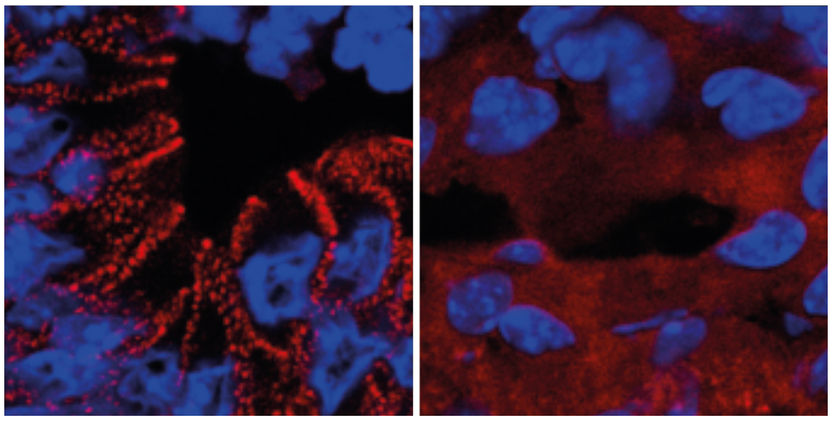Insulin strengthens the intestinal barrier and protects against colorectal cancer
Advertisement
Excess weight promotes the development of insulin resistance and the incidence of colon cancer. Scientists from the Max Planck Institute for Metabolic Research in Cologne identified a new mechanism of the insulin signalling in the intestinal mucosa, which is responsible for maintaining the intestinal barrier and explains the connection between insulin resistance and intestinal cancer.

In healthy mice, the red marked protein desmoplakin is integrated into desmosomes of intestinal cells (left). The protein remains in the cytoplasma when the cells are defective in insulin signalling.
© Max-Planck-Institut für Stoffwechselforschung / Ostermann
Not only nutrients are absorbed through the intestinal mucosa, but also pathogens and germs enter the intestines through food. Therefore, the outermost cell layer of the intestinal mucosa, the intestinal epithelium, acts as a barrier to prevent the penetration of pathogens. The cells are connected to each other by so-called desmosomes, which act like a zip fastener that closely connects the cells.
A destruction of the intestinal barrier leads to the penetration of bacteria, which leads to strong inflammation and thus leads to favourable conditions for intestinal cancer. "In mice that are on a fat diet and overweight, we can observe the so-called 'leaky intestine'," says Anna Lena Ostermann, a doctoral student in Thomas Wunderlich's group who did the main work on this study. She adds: "These mice develop intestinal cancer more frequently than their thin conspecifics.
One consequence of excess weight is insulin resistance, in which the insulin receptors no longer react to insulin. The hormone insulin is secreted by the pancreas when the blood sugar rises as a result of food intake in order to signal the cells to absorb it. The intestinal epithelium also has insulin receptors, although these are not very relevant for the ingestion of food.
Ostermann and colleagues have now been able to show that the insulin signalling pathway in the intestinal epithelium ensures the maintenance of the intestinal barrier. The effect of insulin in this cell layer activates the genes that are responsible for the formation of desmosomes. The reconstruction of the desmosomes as a result of an injury to the intestinal barrier can therefore be less effective in patients with insulin resistance and the risk of intestinal cancer increases.
But why does a signalling pathway responsible for the uptake of sugar into cells also regulate the maintenance of the intestinal barrier? "The body cannot live without the insulin signalling pathway because cells were unable to absorb the sugar needed to produce energy. Maintaining the intestinal barrier is also essential for survival. Therefore, these two processes may be linked to one of the most important signalling pathways," summarises Wunderlich.
Original publication
AL Ostermann, CM Wunderlich, L Schneiders, MC Vogt, MA Woeste, BF Belgardt, CM Niessen, B Martiny, AC Schauss, P Frommolt, A Nikolaev, N Hövelmeyer, RC Sears, PJ Koch, D Günzel, JC Brüning, FT Wunderlich; "Intestinal insulin/IGF1 signalling through FoxO1 regulates epithelial integrity and susceptibility to colon cancer"; Nature Metabolism; 2019.



























































